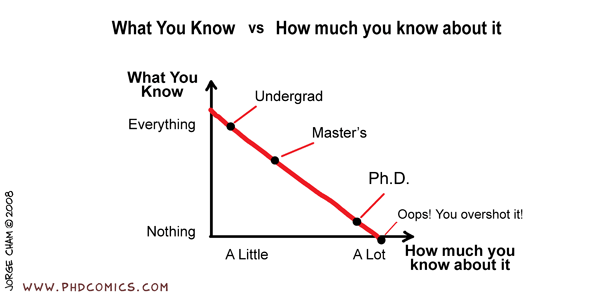Now, the thing is, as you go on in academia, you go down a “rabbit hole” of specializations. Many scientist like to joke that we learn and learn about a subject until you know everything about nothing. We work on a single subject for years (between my masters and my PhD, I have been working on my subject for almost 6 years now), go to conferences related to it, talk and present and write, all the time talking about (mostly) one idea. Even when we go to interdisciplinary conferences, we tend to gravitate, if not anchor ourselves, around presentations that are directly or at least closely related to our thesis subject. While this is perfectly understandable, since we do want and need to know everything that is going on in our area, it means that often we miss out on very interesting developments in other fields.
 |
| From PhDcomics.com |
This vicious circle of specialization explains why only Mochizuki and maybe another few mathematicians, including the three only ones to have read his +500 (!) pages proof of the problem, would fully understand his research. But that doesn’t mean that only them would be capable to talking to others about it; the proof (ha, see what I did there?) is the very interesting, very clear profile that Castelvecchi gives us. Or to a lesser scale, the fact that I manage to explain the works of a zoetrope, even though the last time I dealt with optics and physics in general, was in my first year as an undergrad.
While one doesn’t need to be an expert on a subject to write a piece on it, independent on the level of vulgarization that you are aiming for, it does help to have a background in the field you are going to discuss. The reason why Castelvecchi manages to present to us this profile is not just because he is a good writer (he is), but it is also because he is a good scientist in the sense that he knows which questions to ask and to whom in order to grasp the concept and make it a whole think piece. The reason why so many science pieces in newspapers have many scientists shaking their heads is because, in more cases than we care to admit, those pieces are being written by someone with no scientific background, which means that not only the concepts might remain unclear but also misinformation arises.
So, does it take a rocket scientist to write about rockets? Probably not, but it doesn’t hurt and in fact should be the rule of thumb, that the person writing about rockets knows about rockets and contacts a rocket scientist for all the questions that might arise. The availability of the scientist to comment/help on the piece? That is a subject we will discuss on another occasion.

No comments:
Post a Comment